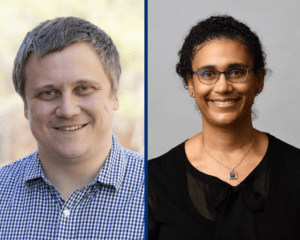The Ralph O’Connor Sustainable Energy Institute (ROSEI) recently hosted a series of webinars for potential PhD candidates that are external to Johns Hopkins University.
The webinars – which were one hour each and hosted on November 6-7 – saw a spike in attendance from the webinars of the previous two years: 142 students joined the 2024 seminars, while 2023’s event had 70 in attendance, and 2022’s was 57.

Webinar co-organizers Yury Dvorkin and Dennice Gayme
“I like to think that doubling our attendance from a year ago is an indication that ROSEI is helping Hopkins become better known for our research in the energy space and recognized as a premier place for aspiring PhD students with interests in these areas,” said Dennice Gayme, a professor of mechanical engineering that co-organized the webinars. “ROSEI has been growing since its inception, adding more faculty and performing more impactful research. It’s nice to see the interest in our programs mirror that.”
Yury Dvorkin, an associate professor of electrical and computer engineering and civil and systems engineering that co-organized the webinars with Gayme, noted that in addition to attendance numbers jumping up, the quality of the discussions rose, too. Many of the prospective students attended having investigated the research of individual faculty members, as well as ROSEI’s research pillars.
The spike in attendance was also matched in terms of ROSEI faculty participating as panelists, which included faculty from the Whiting School of Engineering (WSE), School of Advanced International Studies (SAIS) and Krieger School of Arts & Sciences (KSAS). Dvorkin and Gayme hope to continue expanding faculty representation in 2025.
“Having more ROSEI faculty involved as panelists was great because it made the events more worthwhile for the attendees, and it helped us cast a wider net in terms of the types of applicants that would want to attend,” Dvorkin said. “While this year’s webinars were a great success, our hope is that next year’s are even better. Hopkins is a top option for students to pursue their PhD’s in sustainable energy related fields, so we hope these webinars continue to attract aspiring students from diverse backgrounds whose expertise will push our research efforts further.”
